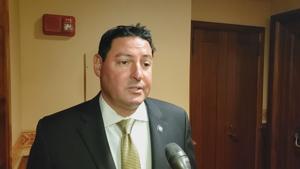
(The Center Square) – Municipalities like Peoria, Springfield and Decatur have passed stricter massage licensing ordinances amid concerns over human trafficking.
State Rep. John Cabello, R-Machesney Park, a law enforcement officer, noted that while ordinances can help, most investigations begin with tips or complaints, not routine licensing checks.
“We used to have quite a few [massage parlors] here in Rockford. You can’t just walk in and inspect. You need a complaint or information from another investigation,” said Cabello. “Once something’s confirmed, you shut them down. The owners go to jail and depending on how long they’re there, they could just move somewhere else.”
Cabello said he finds himself torn between two political instincts: a desire for limited government and a need to crack down on businesses engaged in criminal activity.
“As a Republican, we’re supposed to be for smaller government, less red tape,” he said. “But when it comes to businesses that are known for shadiness, I support these kinds of ordinances. Sometimes it’s a necessary evil. I assume that the police departments [would] be able to handle it if something were to take place. I don’t believe necessarily the city has to have an ordinance.”
The Illinois Department of Financial and Professional Regulation enforces massage therapist licensure and investigates complaints and alleged violations, which can originate from the public, law enforcement or other governmental agencies.
Nancy Bolliger, the executive director of Allies Against Trafficking, claimed that Bloomington has 14 illicit massage businesses and urged the council to require them to register, allowing checks for licensed therapists.
“Since 2018, Springfield, Peoria, Chatham and Morton have passed local ordinances to regulate massage businesses. These laws require businesses to register with the city and verify that their therapists are licensed by the state of Illinois,” Bolliger said during public comment at a Bloomington City Council meeting. “As a result, 11 illicit massage parlors were closed in Springfield. Morton also shut down two illicit spas, including one located just doors from a Kroger grocery store. This criminal activity remains active and is increasing across the region.”
At the Bloomington City Council meeting, Paul Halvorson stressed the toll of human trafficking on both victims and taxpayers, urging a community-wide effort beyond just police or government.
“The people involved aren’t contributing to the community through jobs or families. When they get out, they often rely on the judicial, penal, healthcare or social services systems with no insurance or resources. This ultimately falls on taxpayers,” Halvorson said during public comment. “So everybody needs to come together, including citizens, for education, enforcement and collaboration to try to eradicate this from the community.”




